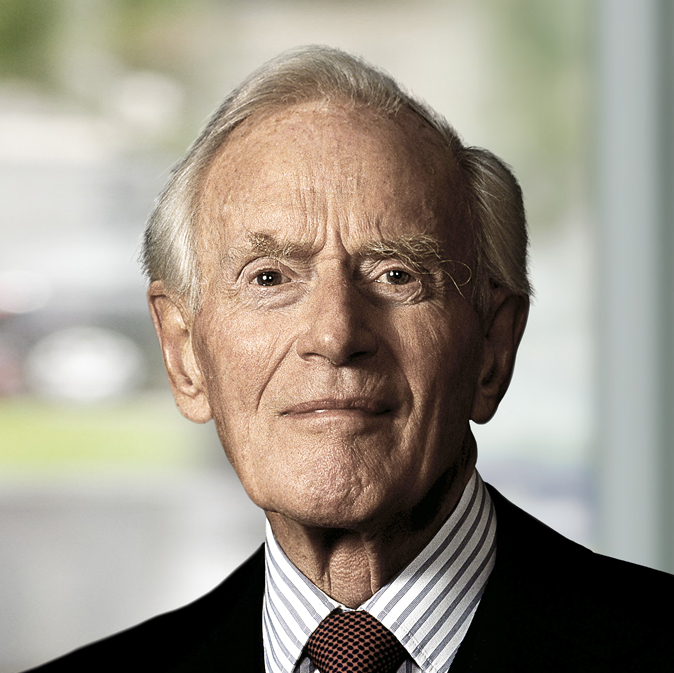An icon, a beacon, a great philantropist or just a profit-obsessed tycoon: these are just some of the opinions you might hear about Maersk Mc-Kinney Møllerin his native country, Denmark. One thing remains clear: this man transformed his family’s shipping company into the world’s largest and put Denmark in the spotlight, giving the world the perfect example of combining business with great vision.
From a family business to a shipping and oil giant
Arnold Maersk Mc-Kinney Moeller was born July 13, 1913, in Copenhagen; he was the son of Arnold Peter Møller, the founder of the AP Møller-Maersk Group, and an American woman Chastine Estelle Roberta Mc-Kinney. From the early years he would learn the shipping business from his father. The company’s roots go back to Mr. Mc-Kinney Moeller’s grandfather, a sea captain, who firmly believed that his son, A. P. Moeller, should be ‘a shipowner’.
A steamship company Dampskibsselskabet Svendborgwas formed in 1904, holding just one secondhand ship as assets. By 1912 the company already owned three shipping companies, and in the late 1920s it had the first oil tanker fleet in Denmark. Seeking to diversify its business activities, the company also acquired a large refinery in Denmark and swaths of land in Africa.
With the German invasion of Denmark in 1940, AP Møller arranged passage for his son and daughter-in-law Emma to the United States, where Maersk Møller was running the family shipping business until his return to Denmark in 1947.
In the 1950s the world of shipping witnessed the revolution of standardised containers, and in 1952 A.P. Moeller-Maersk constructed the first ships designed for carrying those containers.
Also called intermodal container or ISO container, the standardised steel shipping container was developed in the 1950s by the US military and commercial shipping operators. They enabled movement of goods to lorries or trains without being unloaded.
 Just 10 years later, in 1962, AP Møller-Maersk group was granted a concession to exploit oil and natural gas resources in the Danish sector of the North sea during 40 years. The agreement proved rather controversial, since the taxes paid by the company were not subject to fluctuating oil prices, and allowed for substantial revenues when oil prices were high. In 1965, following the death of his father A.P. Møller, Maersk Mc-Kinney Møller became a company-s chairman, remaining in the position until 2003. A.P. Moeller-Maersk experienced a vertiginous growth and became a worldwide conglomerate. Currently it operates in some 130 countries and employs a staff of some 108,000 employees.
Just 10 years later, in 1962, AP Møller-Maersk group was granted a concession to exploit oil and natural gas resources in the Danish sector of the North sea during 40 years. The agreement proved rather controversial, since the taxes paid by the company were not subject to fluctuating oil prices, and allowed for substantial revenues when oil prices were high. In 1965, following the death of his father A.P. Møller, Maersk Mc-Kinney Møller became a company-s chairman, remaining in the position until 2003. A.P. Moeller-Maersk experienced a vertiginous growth and became a worldwide conglomerate. Currently it operates in some 130 countries and employs a staff of some 108,000 employees.
The company’s business areas can be divided into 6 large groups: container shipping and related, including Maersk Line, the global containerized division of the A.P. Møller – Maersk Group, which comprises more than 600 vessels and whose number of containers corresponds to more than 3,800, 000 TEU*; tankers, offshore and related, terminal activities, that provide port management and terminal operation in 63 ports around the world; oil and gas activities, including Maersk Oil, an international oil and gas company with operational production of about 625,000 barrels of oil equivalent per day and exploration activites in Angola, Norway, Greenland and the US Gulf of Mexico; retail and other (Møller helped a childhood friend start a supermarket, which led AP Møller-Maersk becoming the majority shareholder in Dansk Supermarked A/S, which operates Netto, Føtex and Bilka, Denmark’s biggest supermarkets) and technology.
Charitable causes
Møller was personally involved in running his companies, most of which were charitable foundations with Møller as a chairman (others were publicly traded). His management style showed extreme attention-to-detail, for some even excessively so, but Møller felt it his duty to show up for lunch at the Copenhagen office almost everyday and engage in conversation with any employee needing his advice.
Mr. Mc-Kinney Møller also made generous contributions to public projects through a charitable trust founded by his father, Møller Foundation. So, the country received several gifts from the company: Amaliehaven, the harbour-side garden in Copenhagen, the new Copenhagen Opera House, or the restoration of the Old Town, Jylland, in Aarhus, Denmark’s second biggest city. He was even responsible for bringing the largest Rembrandt exhibition to Denmark.
The country was grateful for the gifts received and Maersk Mc-Kinney Møller became one of the few Danes to be made a knight of the Danish Order of the Elephant, one of the two Danish Royal Orders of Chivalry, which is only bestowed upon royalty of heads of state and only in rare cases is awarded to a person of lower rank.
But was something rotten in the state of Maersk?
However, even the larger-than-life could not escape some controversy surrounding his company activities. In 2012 A.P. Møller-Maersk suspended oil tanker trade deals with Iran, following the EU ban on imports of oil from the Islamic Republic. In 2011 it had been already forced to do so as a result of US sanctions. Maersk Line had been operating in three largest Iranian ports of Bandar Abbas, Bandar Khomeini and Asaluyeh.
Earlier this year AP Møller Maersk was fined with a substantial damages compensation, for “knowingly overcharging” the US Defense Deparment to ship cargo to the US military in Iraq and Afghanistan in several ways: over-billing for the operations, billing for delivery delays attributed to the United States, etc.
Last but not least, Globalization Monitor, a labour rights group based in Hong Kong, disclosed allegations of poor working conditions and employment terms, leading to riots amongst workers at a Maersk Container Industry’s plant in a southern Chinese city.
Despite all the controversy, Møller has remained one of the symbols of Danish entrepreneurial spirit. Resisting pressures to outsource his activities to the Far East, he retained the bussiness in Denmark, particularly shipbuilding. A Primer Minister of Denmark Helle Thorning-Schmidt, upon receiving news of his passing, underlined his ‘great engagement in Danish culture which has left his mark through the country’.
*Twenty foot Equivalent Unit – a 20 foot long container
This is a non-profit explanation.






